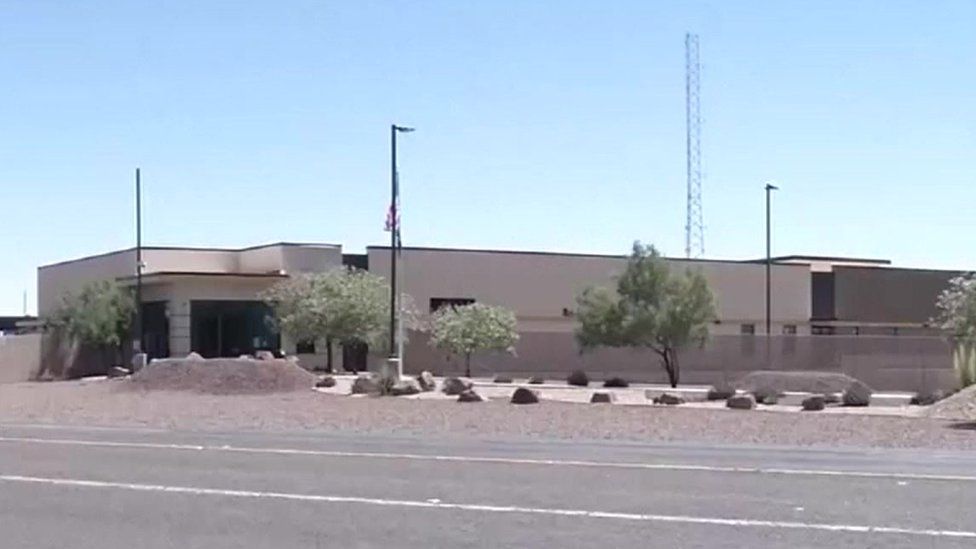Texas migrant children moved from 'horrific cells' after outcry
- Published

Some 250 migrant children have been moved from an overcrowded border station in Texas where they had been held for weeks.
Lawyers given access by a judge said the children were "severely neglected".
One of them told the BBC that children were "locked up in horrific cells where there's an open toilet in the middle of the room" where they ate and slept.
Many parents crossing the US border, most of them from Central America, were separated from their children in 2018.
Separately, border patrol in Texas reported the deaths of seven migrants this week who had apparently attempted to circumvent the immigration system – including two babies and a toddler.
What were the conditions like?
"There was nobody taking care of these children... they were not being bathed on a regular basis," Prof Warren Binford of Williamette University in Oregon told the BBC after visiting the Clint facility in Texas.
"Several hundred of the children had been kept in a warehouse that was recently erected on the facility grounds."
A lawyer who visited the centre in Texas tells BBC Newsday what she saw
"The cells are overcrowded... there's a lice infestation there, there is an influenza outbreak. Children are being locked up in isolation with no adult supervision, who are very, very ill and they're just lying on the ground on mats."
Elora Mukherjee, another lawyer who visited the facility, told CBS News: "They were wearing the same dirty clothing they crossed the border with."
"It is degrading and inhumane and shouldn't be happening in America."
As stories of substandard conditions in facilities have continued to emerge, some volunteers have tried to donate supplies - only to be turned away by border officials.
One group told the Texas Tribune they spent $340 (£267) on diapers, wipes, soaps and toys for the Clint facility, but were completely ignored by all the agents on duty.
Another Clint resident who tried to visit the Clint station told the Tribune: "Knowing what's happening in your community and that you can't give these kids supplies to clean or clothe themselves - it's heartbreaking."
Texas Democratic state congressman Terry Canales later tweeted that Border Patrol also told his office "they do not accept donations".
What have the authorities said?
In a statement, the border authority acknowledged that the Clint facility was not suited to the task.
"US Customs and Border Protection leverages our limited resources to provide the best care possible to those in our custody, especially children," it said.
The sound of migrant children separated from parents (Footage from 2018)
"As our leadership have noted numerous times, our short-term holding facilities were not designed to hold vulnerable populations, and we urgently need additional humanitarian funding to manage this crisis."
The agency said it had moved children to more suitable facilities as soon as space was available.
On Monday, Democratic Representative Veronica Escobar, who had been deeply critical of the reported conditions, said she had been told that only 30 children remained in the Clint facility.
Allow Twitter content?
This article contains content provided by Twitter. We ask for your permission before anything is loaded, as they may be using cookies and other technologies. You may want to read Twitter’s cookie policy, external and privacy policy, external before accepting. To view this content choose ‘accept and continue’.
What are lawmakers doing?
Democrats in the House of Representatives have been trying to push through a $4.5bn bill in emergency aid for the border, but the issue has divided liberals, particularly those in the Hispanic and Progressive Caucuses.
Some lawmakers, including congresswoman Alexandria Ocasio-Cortez, said the additional funding could be used by the White House to continue raids and detentions.
Others, like Appropriations Committee chair Nita Lowey, said Democrats should not allow anger at President Donald Trump "to blind us to the horrific conditions at facilities along the border as the agencies run out of money".
Speaker of the House Nancy Pelosi met her party members on Monday to discuss changes to the bill ahead of a Tuesday vote.
The White House has already threatened to veto the bill, saying it "does not provide adequate funding to meet the current crisis and...it contains partisan provisions designed to hamstring the Administration's border enforcement efforts".
The Trump administration has requested more funding for Immigrations and Customs Enforcement (ICE) and the Departments of Defence and Homeland Security.
Where are the parents?
The separation of migrant children from their parents began in 2018 under a new "zero tolerance" policy from Mr Trump's administration. It saw nearly 3,000 children separated before it was suspended.
Under the policy, announced in May 2018, those who cross the border illegally were to be prosecuted - which required their children to be taken into care.
Yet the US Government Accountability Office has reported that neither the Department of Homeland Security nor the Department of Health and Human Services were aware of the policy before it was publicly announced, and so were not prepared for the increase in children being kept imprisoned.
US child migrants: Five things to know
There are also limits set by the US authorities on how many people can claim asylum each day, resulting in a waiting period that can last months.
Some migrants and their families are instead attempting dangerous crossings far from the official ports of entry, or relying on people smugglers to make the journey.
The seven people found dead this week by US Border Patrol included a woman and her three children who were thought to have died from heat exposure and dehydration, Reuters news agency reports.
Two more men and an unidentified body were found on 19-20 June in two separate locations.
- Published15 June 2018
- Published2 July 2019
- Published20 June 2018
- Published19 June 2018
- Published19 June 2018
- Published18 June 2018